Ask Me Anything: Celebrating Indigenous Voices in the Public Service
June 20, 2023 - Defence Stories

Opening remarks:
Colonel David Grebstad
Closing remarks:
Nicole Elmy
Featuring:
Beverly Ungungai-Foster, Maya Knott, and Lacey McNally
Co-hosted by:
Shawna Wolfe and Sebastion Bob
Date and time:
Audience:
Open to all Government of Canada employees
Register:
Link to join:
Ask Me Anything is now on GC Wiki Collab.
Event Description
This month, we recognize the rich and diverse cultures, voices, experiences, and histories of First Nations, Inuit, and Métis Peoples, and their many contributions to Canada.
Join us as our speakers share their stories, reflections, cultures, and experiences on the Ask Me Anything stage to celebrate Indigenous voices in the public service in honour of National Indigenous History Month!
About the Ask Me Anything series
This session is part of a series of Ask Me Anything discussions that give us a platform to share stories, listen, ask respectful questions and continue on our journey to have more inclusive organisations.
As individuals, you can’t necessarily change where you live. You certainly can’t change your past, but you can adjust who influences you—through the authors you read, the music you listen to, the movies you watch, and the interactions with your community. The ‘Ask Me Anything’ series provides you with an opportunity to increase your perspective — to learn from the lived experiences of individuals who are bravely sharing their stories to help educate and move the public service towards a culture where equity is embedded.
The series also provides an opportunity for you to know that you aren’t alone. These experiences, especially the negative ones, are systemic and happen all too frequently throughout the public service. The objective of shining this light is to continually increase the network of public servants ready to take action and move forward toward a culture of inclusivity and belonging.
Opening Remarks, Colonel David Grebstad, CD, Director of Middle East and Africa Policy, Department of National Defence
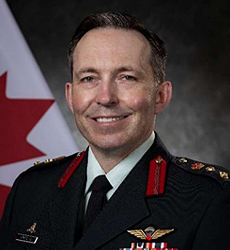
Colonel Grebstad was born in Dryden, ON, and joined the Canadian Armed Forces (CAF) as a non-commissioned member (NCM) reservist with 116 Independent Field Battery, Royal Canadian Artillery in 1990. He became an officer in 1992 and completed a component transfer to the Regular Force in 1999.
Since joining the Regular Force, he has served in numerous regimental, school and staff positions at the operational and strategic level and is currently the Director of Middle East and Africa Policy in the Director General International Security Policy group.
Colonel Grebstad has completed operational tours in 2002 in Afghanistan on Op APOLLO, in 2014 on Op REASSURANCE in NATO Joint Forces Command Naples; and in 2018 in Egypt on Op CALUMET. His command billets were Battery Commander Y Battery, 2 RCHA and CO Administration Branch, Canadian Forces Base Borden (CFB Borden).
He graduated from the University of Manitoba, the University of New Brunswick and the Royal Military College of Canada. An avid amateur historian, he has been published in several peer-reviewed academic journals.
Colonel Grebstad is often found in the gym labouring under embarrassingly light weights. When he runs, it is slowly. He is a passionate sports fan but lacks any athletic talent. He is a proud citizen of the Manitoba Metis Federation, and he and his wife, a Health Services Officer in the Canadian Armed Forces, reside in Ottawa.
Closing Remarks, Nicole Elmy, National Director of Indigenous Relations, Canadian Coast Guard
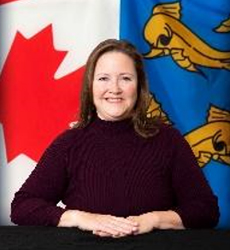
Nicole is the first National Director of Indigenous Relations, Canadian Coast Guard (CCG), where she is accountable for supporting First Nations, Métis, and Inuit partnerships and collaboration nationally and in inter-departmental fora. Before joining CCG, Nicole led the establishment of the Canada Border Services Agency’s first Indigenous Affairs Secretariat and delivered on key commitments, including an Indigenous Framework and Strategy for the Agency. She recently completed an assignment with the Department of Fisheries and Oceans (DFO) as the Associate Regional Director General for the Ontario and Prairies Region.
Nicole is a proud member of the Mohawks of the Bay of Quinte First Nation. She lives her passion for advancing Reconciliation through respecting each individual’s ongoing journey and promoting the voice of Indigenous youth in the Public Service. Nicole advocates strongly for education and cultural awareness as meaningful demonstrations of Reconciliation commitments.
Meet our amazing panellists
Beverly Ungungai-Foster, Indigenous Advisor, Governor General of Canada
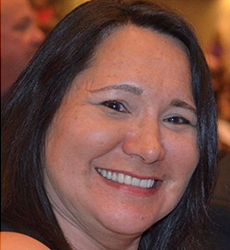
Beverly was raised in Baker Lake, Nunavut and is a proud Inuk mother of one Panik (daughter). She has an extensive background in Arctic affairs including working as Special Assistant for the first Ambassador of Circumpolar Affairs, and working at Nunavut Tunngavik Inc. (NTI). Beverly having grown up in the Arctic brings a unique personal perspective. She spent a decade at Crown-Indigenous Relations and Northern Affairs Canada (CIRNA) formerly known as Indigenous and Northern Affairs Canada (INAC), progressing from an Inuit Training and Development Advisor, to manager, through to a Senior Policy Advisor to the Regional Director General. Relocated to CIRNAC HQ as Senior Policy Advisor at Northern Governance Branch to work on Nunavut Devolution from 2010-2019.
In 2019, Beverly transferred to her position as an Indigenous Relations and Partnerships Manager at the Canadian Coast Guard Arctic region, where she felt privileged and honoured to be involved in the creation of the new Arctic region. Although away from her homeland, Beverly is appreciative of all the great opportunities she has had to impact Inuit and Northern Affairs in a government environment.
More recently, Beverly is on a one-year assignment as Indigenous Advisor for the Governor General’s office.
Maya Knott, Senior Project Officer, Indigenous Programs, Department of National Defence
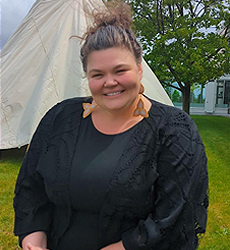
Aaniin! / Kwey Kwey! / Hello!
Maya Knott ndizhnikaaz. Curve Lake doonjibaa, Mikinaak doodem. / My name is Maya Knott. I am from Curve Lake First Nation. My clan is turtle.
I am an Ojibway kwe / woman that hails from Curve Lake First Nation and I speak Anishinaabemowin. Curve Lake First Nation is part of the Williams Treaty and is the territory in which my family and extended relations reside. I am an avid hunter, trapper, and angler. Utilising our Treaty arrangements, as well as respecting authoritative regulations, I happily enjoy participating in skills that directly coincide with my traditional heritage and values. The ability to provide for and educate my children, my family and extended relations, is something I both cherish and respect. Traditional knowledge is based on acquired skills, trade, storytelling, language, creativity, cultural appreciation, and most of all community.
My father is Ojibway, with our extended relations and history extended throughout Anishinabek Nation's traditional territory. My mother is a first generation immigrant from Bavaria. I was born on reserve, pursued post-secondary and career development dreams and goals off reserve for over a decade, and now reside off reserve, within Williams Treaty territory, with my family of 2 daughters, 2 bonus daughters, and my partner, in our log home with 40 acres of bush paradise.
I explored and lived in Ottawa, Algonquin Territory while obtaining both Police Foundations at Algonquin College and a BA Honours of Criminology, Concentration in Law at Carleton University. Upon obtaining my post secondary pursuits, I began work at National Defence in 2009. I have been blessed and thankful for the career within this wonderful department, since that time.
I am the Senior Project Officer, Indigenous Programs at CFSG (O-G)! I am thankful and appreciative for the opportunity to embrace my Indigenous culture and extend the opportunity for the Canadian Armed Forces (CAF) community to participate in their own personal journey. A journey in which the CAF and Indigenous programming allows for a safe and spiritually accepting space. Allowing for personal growth and enrichment that may create a space within each participating individual that they unknowingly yet humbly needed. A position that is tangible and openly available for outreach and support. Conducting workshops, events, seminars, traditional teachings, and ceremonies for the CAF and Indigenous communities to be welcomed to embrace and participate in.
Lacey McNally, Senior Policy Analyst, Legislation, Engagement and Regulation Directorate, Community Infrastructure Branch, Indigenous Services Canada
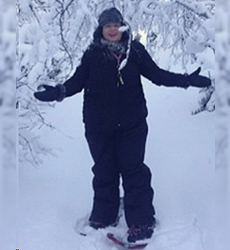
I am Métis (registered member of the Métis Nation of Alberta), born and raised in the Edmonton area.
After completing my degree at University of Alberta’s Faculty of Native Studies, I gained experience working in front line child protection, youth treatment, and the education system while working in Edmonton, Northern Alberta, and Northwest Territories. Since joining Indigenous Services Canada, I have worked in the Alberta Region for Jordan’s Principle and Education as Team Lead/Manager/Acting Director, and in the National Capital Region (NCR) for Income Assistance and Safe Drinking Water Legislation as a Policy Analyst.
In my personal time, I am typically enjoying various outdoors activities with my dog or am engaged in advocacy on Indigenous, child welfare or animal rights/welfare issues.
Meet our co-hosts
Shawna Wolfe, Senior Policy Advisor, Indigenous Relations and Partnerships Policy Division, NHQ Department of Fisheries and Oceans
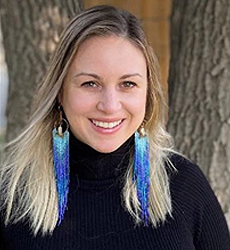
Shawna is Senior Policy Advisor with the Indigenous Relations and Partnerships Policy Division (IRPP) situated in Strategic Policy in National Headquarters with Fisheries and Oceans Canada. The IRPP’s overall objective is to ensure a more consistent and coordinated approach to engagement and consultation and assist the Department in improving relationships with Indigenous Peoples in Canada. This is accomplished through providing strategic advice and guidance; the development of unique tools and resources; and leading an active national coordination network with key members from across the Department.
Shawna is a proud Red River Métis citizen, born and raised and still living in her nation's homeland in Winnipeg, Manitoba with ancestral and contemporary ties to the Métis communities of Powerview/Pine Falls, St.Laurent, St. Eustach Manitoba. She feels honoured to work in a federal space designed to improve relationships between the Department and Indigenous Peoples in Canada. She is also committed to continuous learning, allyship, spreading awareness and challenging biases and racism towards Indigenous Peoples and always searches for opportunities to celebrate her culture and honour her ancestors and the resilience of all Indigenous Peoples in Canada.
Shawna is a mother of two, a wife, a daughter, a sister, and aunty to many. She has always felt a strong connection to water and wildlife, and also adores biking, hiking and playing music.
Marsee | Miigwetch | Thank You | Ekosi | Merci | Pidamiya ye | Marsi
Sebastian Bob, Junior Internal Communication Officer, Internal Communications, Event Management and Publications, Canadian Coast Guard
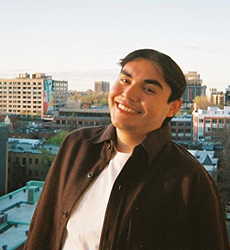
Sebastian is an Irish and Indigenous student from the Tahltan, Tlingit, and Carrier nations in Northwestern British Columbia. He was born and raised in Vancouver, BC and graduated with a Dual Dogwood Diploma for French Immersion students. In 2019, he moved to Montreal, QC, to pursue his academic journey at Concordia University. Over the course of four years, Sebastian has been working towards a Bachelor of Arts degree, double majoring in Communications Studies and First Peoples Studies. Given the diversity of Montreal, Sebastian has fostered many relationships with Indigenous peoples from across Canada, which provided him with the space to reconnect with his Indigenous culture. He understands the difficulties of urban Indigenous peoples who spent their formative years away from their traditional territory, culture, and communities.
Through the Federal Student Work Experience Program, Sebastian has worked three terms as a student with the Government of Canada. Amid the global pandemic, Sebastian began working with Fisheries and Oceans in the Pacific region for the Aboriginal Fishing Strategy team as an Agreements Drafter. In hopes of gaining more experience and applying his knowledge of communications, Sebastian worked with the DFO Social Media team based out of National Headquarters for two terms. Sebastian has recently joined the Innovation, Planning and Engagement Branch under the Internal Communications team for the summer term. Sebastian is dedicated to sharing his communications expertise through an Indigenous lens while offering reconciliation tactics and cultural sensitivities.
Mission - Ask Me Anything Series
We recognize that individuals are composed of a multitude of layers that make us who we are. We do not fit easily in one box or another and we can’t be neatly counted. We represent the mosaic of Canada.
It is important that we find value in each other’s experiences, differences and unique characteristics. When we build our cultural competencies, we are able to work better together in our teams and respond to each other with relevance, empathy and compassion. By celebrating and sharing our authentic selves, we gain greater appreciation of each other and the diversity that surrounds us.
We know through diversity, that workplaces and communities are stronger, more successful and resilient. And most important, it creates spaces of inclusion and fosters a sense of belonging at work where people feel valued.
#AMAChallenge
We encourage others to have courageous conversations with their peers. Use the monthly Ask Me Anything sessions as an opportunity to have brave conversations in your workplaces with your teams.
Here’s what you need to do:
- Invite your leaders and colleagues in your organisation to an Ask Me Anything watch party, tune in live and watch the session together. Make sure it’s in their calendars.
- Before the watch party, book an “After the AMA – Team Session” with your immediate team for the day after the event for 30-60 minutes. Share the resource guide and have these questions for discussion.
After the AMA: Team session discussion questions
- What was my main takeaway – expand and share an amazing quote, story or moment
- What made me uncomfortable/ what was one of my blind spots?
- What is an example of systemic discrimination that I am aware of in my life?
- What am I not going to do anymore?
- How can I use my voice/ influence? – both overtly/covertly
- Where am I going to dig in and learn more?
- How will I continue this conversation?
It is important that we find value in the experiences, the unique characteristics of each other. When we develop our cultural competence, we are able to work better together within our teams and respond to each other with relevant empathy and compassion. By celebrating and sharing our authentic selves, we gain a greater appreciation for each other and the diversity that surrounds us.
Thank you to our contributors
Thank you to our contributors from across the Public Service of Canada – Canadian Coast Guard, National Defence, Canadian Armed Forces, Department of Fisheries and Oceans, Indigenous Services Canada, and the Office of the Governor General.
Opening remarks:
Colonel David Grebstad
Closing remarks:
Nicole Elmy
MCs:
Shawna Wolfe and Sebastion Bob
Panellists:
Beverly Ungungai-Foster, Maya Knott, and Lacey McNally
Production Team:
Terri-Ann Hurst, Tara Lockhart, Shelby Racine, Michel Mainville, Melissa Michaud, Quinn Brown, Bernadeth Betchi, Kelly Brewer-Balch, Terri Graham, Lyrique Richards, Samantha Moonsammy